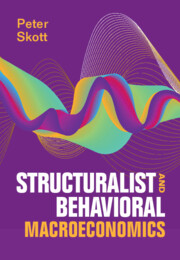Book contents
- Frontmatter
- Contents
- Figures
- Preface and Acknowledgments
- 1 Introduction: The State of Macroeconomics
- 2 The Lucas Critique and Representative Agents
- 3 Household Consumption and Saving
- 4 Saving in a Corporate Economy
- 5 Phillips Curves and the Natural Rate of Unemployment
- 6 Fairness, Money Illusion, and Path Dependency
- 7 Earnings Inequality, Power Bias, and Mismatch
- 8 Macroeconomic Adjustment and Keynes’s Instability Argument
- 9 Growth and Cycles
- 10 Endogenous Growth Cycles with or without Price Flexibility
- 11 Secular Stagnation and Functional Finance
- 12 Concluding Comments: Evidence-Based Macroeconomics and Economic Theory
- References
- Author Index
- Subject Index
12 - Concluding Comments: Evidence-Based Macroeconomics and Economic Theory
Published online by Cambridge University Press: 10 November 2023
- Frontmatter
- Contents
- Figures
- Preface and Acknowledgments
- 1 Introduction: The State of Macroeconomics
- 2 The Lucas Critique and Representative Agents
- 3 Household Consumption and Saving
- 4 Saving in a Corporate Economy
- 5 Phillips Curves and the Natural Rate of Unemployment
- 6 Fairness, Money Illusion, and Path Dependency
- 7 Earnings Inequality, Power Bias, and Mismatch
- 8 Macroeconomic Adjustment and Keynes’s Instability Argument
- 9 Growth and Cycles
- 10 Endogenous Growth Cycles with or without Price Flexibility
- 11 Secular Stagnation and Functional Finance
- 12 Concluding Comments: Evidence-Based Macroeconomics and Economic Theory
- References
- Author Index
- Subject Index
Summary
This concluding chapter offers a few remarks on empirical work and its relation to economic theory. Econometricians have been gaining access to more and better data, and significant progress has been made in the techniques and procedures that are used to extract information from the data. But the data still don’t speak for themselves. Recent contributions on regional fiscal multipliers and state-level inflation in the US are used to illustrate the need for theory to extrapolate from regressions to generalizable implications. Stripped-down New Keynesian Phillips curves, for instance, are used to interpret inflation data, despite the abject empirical failure of these Phillips curves. The imaginative use of new data and careful attempts to identify causal effects clearly can be immensely helpful. But dogmatic adherence to an untenable, scholastically motived theoretical framework can lead to a curious combination of sophisticated econometrics and a willingness to engage in ad hoc handwaving in the interpretation of the data. The ambition in this book is to sketch an alternative framework with behavioral and structural assumptions that are evidence based.
Keywords
- Type
- Chapter
- Information
- Structuralist and Behavioral Macroeconomics , pp. 336 - 341Publisher: Cambridge University PressPrint publication year: 2023

